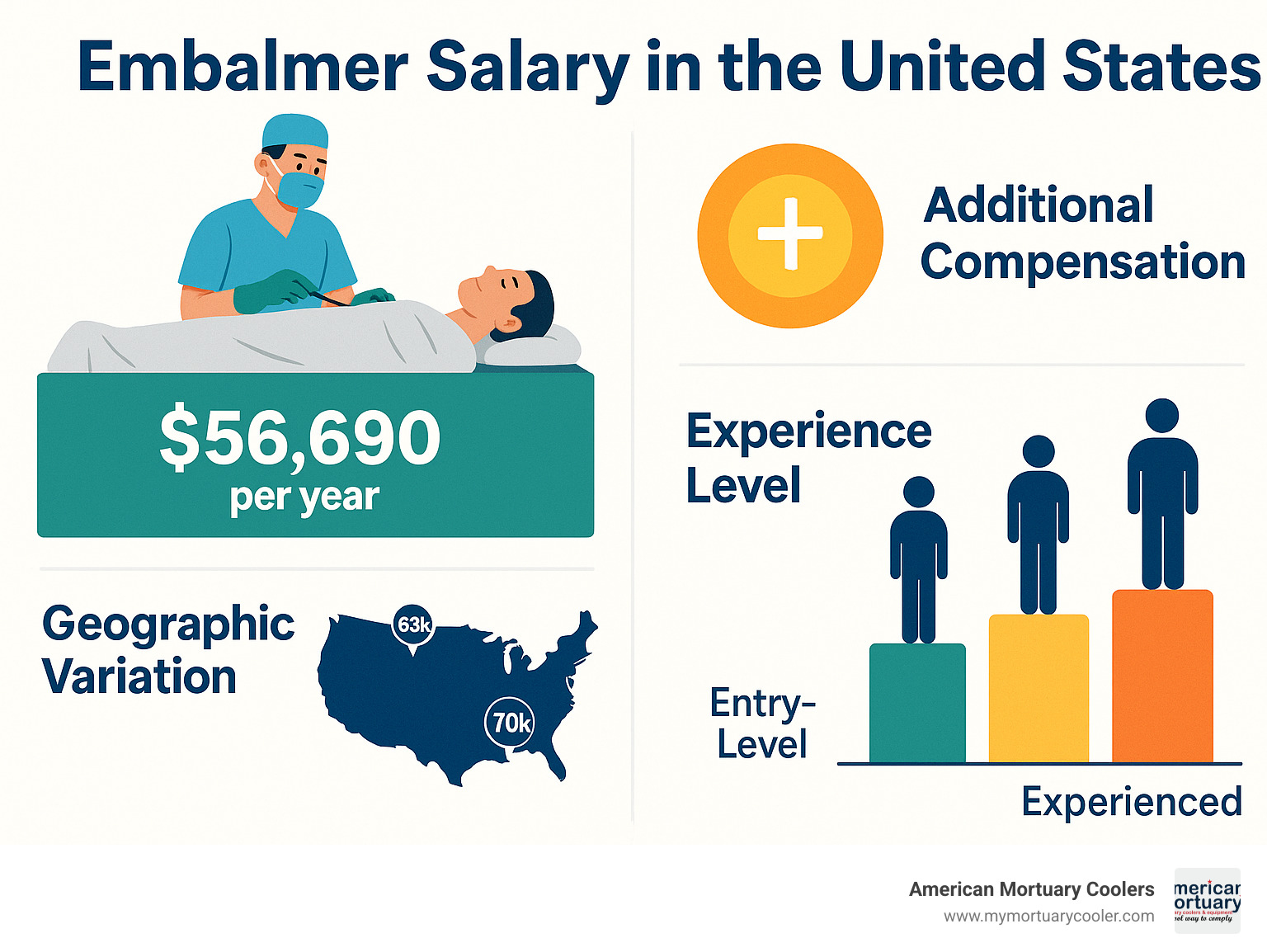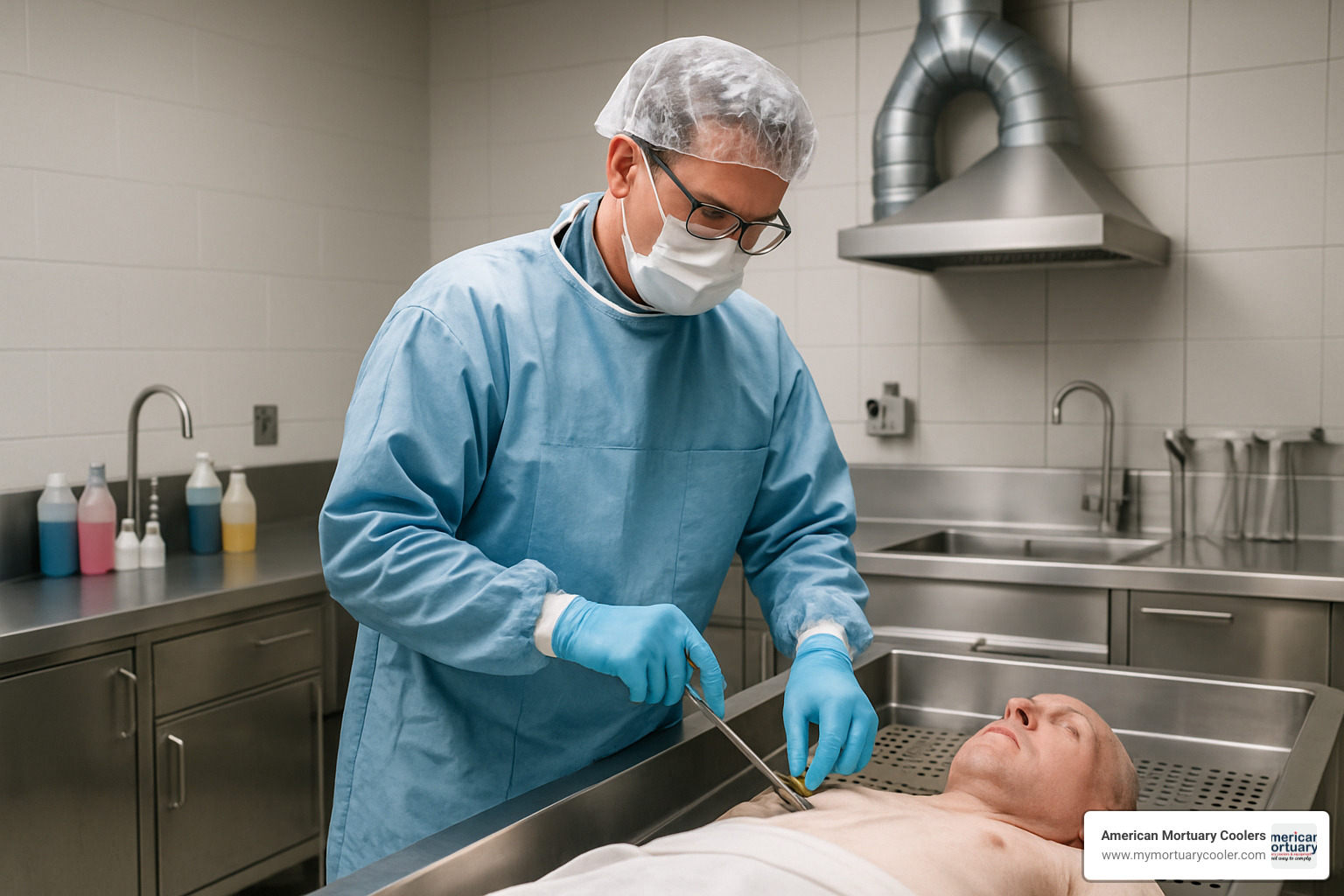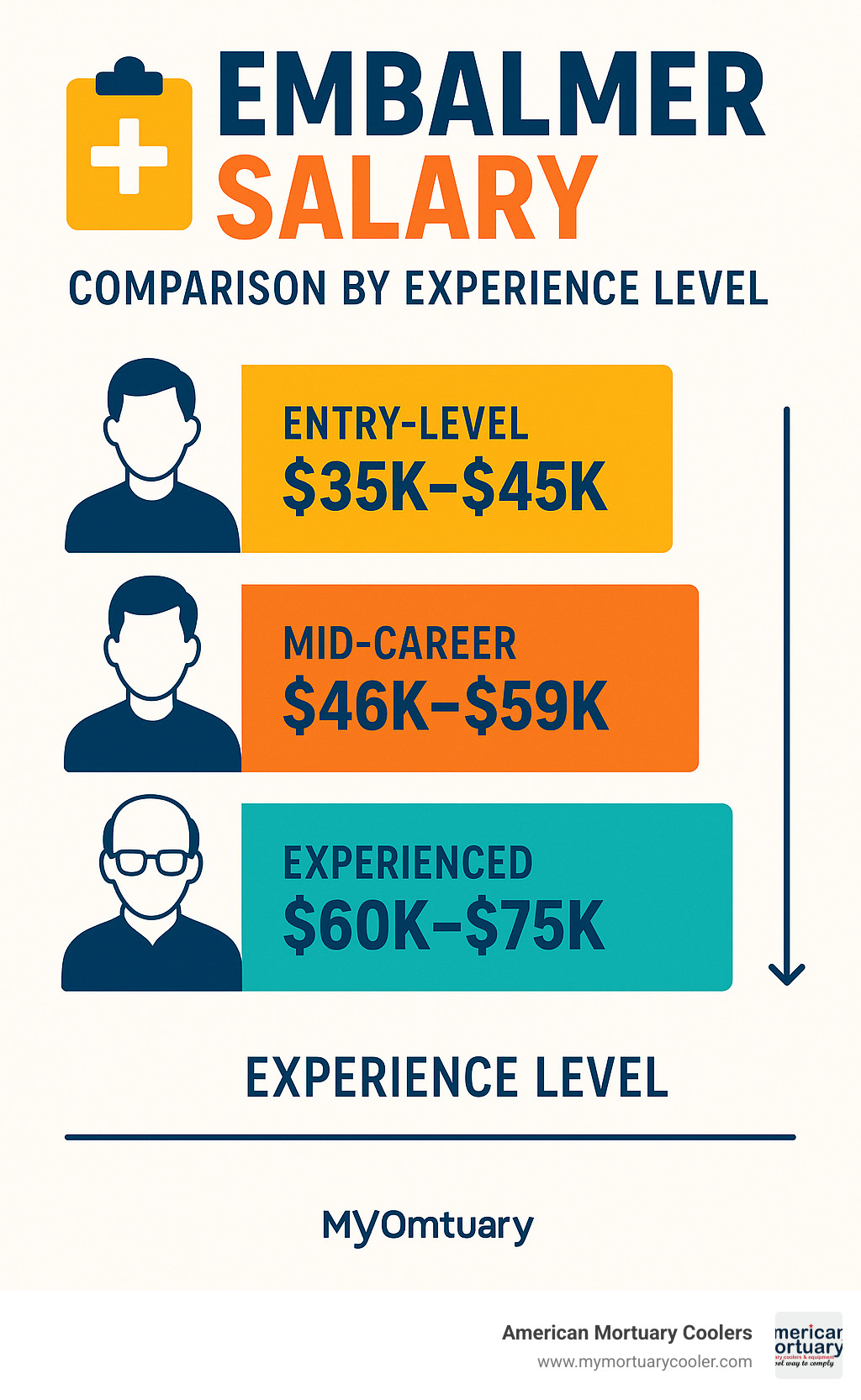Understanding Embalmer Compensation in the Funeral Industry
The average embalmer salary in the United States falls between $54,090 (median) and $56,690 (mean) per year. Here's a quick breakdown of what embalmers typically earn:
| Percentile | Annual Salary | Hourly Wage |
|---|---|---|
| Entry-Level (10th) | $35,360 | $17.00 |
| Median (50th) | $54,090 | $26.00 |
| Experienced (90th) | $79,650 | $38.29 |
Embalmers play a crucial role in the funeral service industry, providing essential services to families during their most difficult times. Their specialized skills in preservation and presentation require specific education, licensing, and technical expertise that directly impacts their earning potential.
While the national averages provide a helpful baseline, embalmer salary figures vary significantly based on geographic location, experience level, and employer type. For instance, embalmers in California earn an average of $63,090 annually, while those in New York can expect around $70,440 per year. These regional differences reflect both market demand and cost of living considerations.
The path to becoming an embalmer involves substantial investment in education and apprenticeship, with most professionals holding at least an associate's degree in mortuary science and completing 1-3 years of supervised training. This specialized preparation, combined with state licensing requirements, establishes embalmers as technical professionals whose compensation reflects their unique skill set and the essential nature of their work.
I'm Mortuary Cooler, a national-level mortuary cooler supplier with extensive experience tracking embalmer salary trends across funeral facilities of all sizes throughout the United States. My work with funeral directors has provided insights into how preparation room equipment and efficiency directly impact professional compensation in the death care industry.

Common embalmer salary vocab:
What Does an Embalmer Do?
Behind the scenes of every funeral service, embalmers perform a delicate dance of science, technical precision, and artistry. Think of them as the unseen heroes who help families see their loved ones one last time with dignity and peace.
At its heart, embalming is about creating a meaningful goodbye. Embalmers preserve the deceased using specialized chemicals that temporarily halt decomposition by replacing bodily fluids with embalming solutions. They thoroughly sanitize the body to prevent disease transmission – a critical public health function rarely acknowledged outside the profession.

The most challenging yet rewarding aspect might be the restorative work. Embalmers delicately repair damage from illness, injury, or trauma, helping to create a natural appearance that brings comfort to grieving families. This involves careful cosmetic application – applying makeup and styling hair to achieve a lifelike presentation that helps loved ones recognize the person they knew.
Throughout this process, meticulous documentation ensures compliance with state regulations – a less glamorous but essential responsibility that protects both the public and the profession.
The preparation room, often tucked away in funeral homes, serves as the embalmer's workshop. These spaces feature specialized ventilation systems, proper drainage facilities, and secure chemical storage areas. Safety isn't optional – strict OSHA protocols govern everything from handling biohazardous materials to chemical management.
Death doesn't follow a 9-to-5 schedule, and neither do embalmers. Irregular hours, including evenings and weekends, come with the territory. Many embalmers remain on-call to respond to deaths outside regular business hours, a demanding reality that directly impacts the embalmer salary structure through on-call premiums and overtime compensation.
Want to understand the fascinating science behind this essential process? Learn more about the embalming process in our detailed guide.
Required Education & Training
Becoming an embalmer isn't a career you stumble into – it requires dedicated education and hands-on training. Most embalmers complete a 2-4 year mortuary science program accredited by the American Board of Funeral Service Education (ABFSE).
These programs aren't for the faint of heart. Students tackle challenging coursework in anatomy, chemistry, and pathology alongside specialized classes in restorative art, embalming techniques, funeral service law, ethics, and business management. The laboratory experience is particularly valuable, providing hands-on training with the specialized equipment embalmers use daily.
After graduation comes perhaps the most formative experience – the apprenticeship. For 1-3 years, aspiring embalmers work under licensed practitioners, completing 25-50 embalming procedures (requirements vary by state). This intensive practical training shapes theoretical knowledge into real-world skills.
Licensing & Continuing Education
Every state requires embalmers to be licensed, though specific requirements vary. The path typically includes passing the National Board Examination, administered by The Conference of Funeral Service Examining Boards, which tests both scientific knowledge and artistic skills.
Many states add a jurisprudence exam covering state-specific funeral laws and regulations, ensuring embalmers understand the legal framework in which they operate. Background checks are common, reflecting the sensitive nature of this work and the trust families place in death care professionals.
The learning never stops. Licensed embalmers must complete continuing education – typically 5-12 hours annually – to maintain their credentials. These courses might cover emerging techniques, new chemical formulations, or updates to regulations.
Embalmer Salary: National Averages, Ranges & Percentiles
According to the latest Bureau of Labor Statistics data from May 2023, the average embalmer salary in America comes in at $56,690 per year. This figure represents what embalmers across the country are earning, from those just starting out to veterans with decades of experience.
The median annual wage sits slightly lower at $54,090, meaning half of all embalmers earn above this amount and half earn below. The closeness between the mean and median tells us something interesting - embalmer pay is fairly evenly distributed without huge outliers skewing the numbers.

If we break down the embalmer salary range more specifically, we can see the full spectrum of what professionals are earning:
| Percentile | Annual Salary | Hourly Wage | Experience Level |
|---|---|---|---|
| 10th | $35,360 | $17.00 | Entry-level |
| 25th | $41,490 | $19.95 | Early career |
| 50th (Median) | $54,090 | $26.00 | Mid-career |
| 75th | $62,680 | $30.13 | Experienced |
| 90th | $79,650 | $38.38 | Highly experienced |
It's worth noting that these BLS figures only cover base salary. When you factor in bonuses, profit-sharing, and overtime (which can be substantial in a profession that often requires on-call hours), the total take-home pay can jump significantly higher.
In fact, Glassdoor's estimates paint an even rosier picture, suggesting a median total compensation of $71,319 annually. Their data shows base pay ranging from $52,000 to $87,000, with additional compensation adding another $3,000 to $6,000 to embalmers' annual earnings.
Understanding the embalmer salary percentiles
The journey from entry-level to experienced embalmer comes with substantial financial rewards. Those just starting out (10th percentile) earn around $35,360 annually, often while completing apprenticeships or handling simpler cases under supervision.
By mid-career (50th percentile), when embalmers typically have 5-10 years of experience and work independently on a variety of cases, that figure jumps to $54,090. The most experienced professionals (90th percentile) can command nearly $80,000 in base salary alone, reflecting their 15+ years of expertise, supervisory responsibilities, and mastery of challenging restorative techniques.
But the story doesn't end with the base embalmer salary. The total compensation package often includes significant extras that can boost earnings by 15-30%.
State-by-State embalmer salary breakdown
Where you practice can dramatically impact your earning potential as an embalmer. The geography factor in embalmer salary can't be overstated.
New York embalmers enjoy some of the highest wages in the country, averaging $70,440 annually. California professionals aren't far behind at $63,090. Connecticut and Nebraska actually top both, with average earnings of $77,140 and $78,940 respectively.
Urban embalmers typically earn more than their rural counterparts. In the New York-Newark-Jersey City metro area, embalmers average $73,770, while those in San Francisco-Oakland-Hayward bring home about $71,670.
Key Factors That Influence Embalmer Pay
What really affects how much you can earn as an embalmer? Let's talk about what makes the biggest difference in your paycheck beyond just where you live.
Experience is a major factor – and it pays off over time. Each additional year typically adds 1-2% to your base embalmer salary, with noticeable jumps when you hit the 5, 10, and 15-year milestones. According to PayScale, if you've been in the profession for a decade, you're likely earning about 20% more than someone just starting out. Stick with it for 15+ years, and you could be taking home 40-50% more than entry-level embalmers.
Where you work matters too. Large corporate funeral chains often offer structured pay scales with clear advancement paths, but they might cap how much you can ultimately earn. Independent funeral homes might start you at a lower embalmer salary, but could offer better long-term earning potential through profit sharing or even partnership opportunities as you become established.
Your education level makes a difference in your wallet too. While an associate's degree will get you in the door, embalmers with bachelor's degrees in mortuary science earn approximately 15% more on average. Those additional courses and training really do pay dividends.

Specialization can significantly boost your earning potential. If you develop expertise in challenging restorative art cases, donor services, or work with medical examiners, you can command premium rates. Similarly, additional certifications beyond your basic license – like becoming a Certified Crematory Operator or earning advanced restorative art credentials – can bump your embalmer salary by 5-10%.
The unpredictable nature of death means embalmers often work unusual hours. Those willing to handle nights, weekends, or on-call rotations typically receive premium pay rates, sometimes 15-25% above standard hourly wages. This can add up substantially over time.
In some regions, particularly the Northeast and West Coast, embalmers may belong to labor unions. This typically results in standardized pay scales and better benefits packages, which can significantly improve total compensation.
Industry analysts and equipment suppliers also track salary data, though American Mortuary Coolers offers more comprehensive regional analysis that includes location quotient (LQ) factors – a fascinating way to understand regional demand.
Scientific research on location quotient
Comparing Embalmer Pay With Related Funeral Professions
When it comes to careers in the funeral industry, embalmers are just one piece of a larger professional puzzle. Understanding how an embalmer salary stacks up against related roles gives you a clearer picture of your earning potential in this unique field.
Funeral directors typically earn around $58,310 annually—about 3% more than embalmers. While the numbers are close, the roles differ significantly. Directors spend their days meeting with families, coordinating services, and handling business operations, while embalmers focus on the technical preparation work behind the scenes.
Many professionals wear multiple hats as morticians, combining both directing and embalming duties. This versatility is reflected in their average salary of $56,850. Being able to serve families from first call to final disposition often leads to increased responsibility and earnings potential.
Funeral arrangers, who primarily help families select services and merchandise without the technical responsibilities, earn substantially less at around $33,280 yearly. This significant difference highlights the value of the specialized skills and licensing that embalmers bring to the table.
Those just entering the field as apprentice embalmers can expect to earn between $32,000 and $38,000 annually—about 60-70% of what their licensed mentors make. This apprenticeship period is a necessary investment in future earning potential.
At the specialized end of the spectrum, dedicated restorative artists who focus exclusively on complex cosmetic and reconstructive work command $65,000-$75,000 on average. Their premium pay reflects the advanced artistic skills required to help families see their loved ones as they remember them.
In smaller funeral homes, particularly in rural areas, you'll often find professionals handling multiple roles—the same person might serve as both embalmer and funeral director. This versatility can boost overall earnings through combined compensation structures.
More info about mortician salaries
Salary Gap Analysis
The embalmer salary path has some interesting nuances when compared to other funeral service careers.
While embalmers and funeral directors might start at similar pay levels, directors typically enjoy higher long-term earning potential. Their customer-facing responsibilities open doors to management positions and even ownership opportunities that can significantly boost income.
Technical embalmers who stay focused solely on preparation room work generally hit a salary ceiling around $80,000. Meanwhile, those who transition into management roles can push beyond $100,000 annually as funeral home managers or owners. This creates a natural fork in the career path—stay technical or move toward management.
Location matters too. In rural communities, embalmers and funeral directors see a relatively small pay gap of just 3-5%. Urban markets tell a different story, with directors earning 10-15% more than their embalming colleagues, reflecting different service expectations and business structures in metropolitan areas.
Competing companies like Matthews Aurora Funeral Solutions and Batesville offer their own salary data that generally aligns with these findings, though their focus tends to be more on funeral directors than embalmers specifically.
Career Outlook, Advancement & Industry Trends
The future landscape for embalmer salary presents a mixed picture. According to Bureau of Labor Statistics projections, employment in this field is expected to decline by about 5.3% from 2014 to 2024. This might sound concerning at first, but the reality is more nuanced.
Several significant shifts are reshaping the profession. Cremation rates have surged past 57% nationally in 2022, as reported by the National Funeral Directors Association. At the same time, the funeral industry continues to consolidate, with corporate entities acquiring independent funeral homes and often centralizing preparation services. We're also seeing growing interest in green funeral options that skip traditional chemical preservation altogether.
Yet despite these challenges, important counterbalancing factors exist. America's aging population, particularly as Baby Boomers enter their later years, ensures steady demand for death care services. Many funeral directors report struggling to find qualified embalmers – creating what industry insiders call a "skills gap" that may actually help maintain embalmer salary levels even as total job numbers decline. Additionally, advances in preservation techniques and restorative methods are creating exciting new specialties for forward-thinking practitioners.

The most successful professionals in this field aren't standing still – they're adapting to these changes by developing specialized expertise, pursuing management roles, or positioning themselves within growing segments of the industry.
Everything You Need to Know About a Mortuary Science Degree
Pathways to Higher Earnings
If you're looking to boost your earning potential as an embalmer, several promising career paths can take you beyond the standard salary ranges.
Specialization offers significant premiums. Embalmers who develop expertise in donor services and tissue recovery can earn 15-20% more than the average. Those skilled in trauma restoration typically see a 10-15% bump in pay. Working with medical examiners or coroners brings valuable government benefits, while those trained for mass casualty response can secure premium contract rates.
The management track presents another avenue for advancement. As a Preparation Room Manager or Supervisor, you could earn between $65,000 and $85,000. Technical Directors overseeing multiple locations often make $75,000 to $95,000, while Regional Embalming Consultants can command $80,000 to $100,000.
Business ownership represents the highest earning potential. Whether you become a partner in an existing funeral home, open your own establishment, or provide trade embalming services to multiple funeral homes, taking this entrepreneurial leap can significantly boost your income.
Industries & Top-Paying Employers
While most embalmers (3,260 out of 3,380) work in traditional death care services, alternative settings can offer equally attractive or even better compensation.
Death care services remain the primary employer, with an industry mean wage of $56,690. However, educational institutions like mortuary science programs typically offer $60,000-$80,000 plus benefits for experienced embalmers serving as instructors. Medical schools, which require specialized embalming skills for anatomical preparation, pay between $65,000-$85,000. Government agencies such as medical examiners' offices and military mortuary affairs provide stable employment with solid benefits and predictable salary scales.
Competitors in the funeral industry equipment space like Frigid Fluid Company and Pierce Chemical offer their own salary surveys that generally support these findings, though American Mortuary Coolers' data tends to be more current and regionally specific.
Several companies stand out for their competitive embalmer salary packages. Service Corporation International pays $21-$31 per hour, while Dignity Memorial offers annual salaries ranging from $46,000 to $69,000. Carmon Community Funeral Homes ranks as a top-rated employer on Glassdoor.
Glassdoor Economist pay overview
Frequently Asked Questions About Embalmer Salary
What is the highest reported embalmer salary?
When funeral professionals ask about top-tier earnings in the field, the numbers can be quite encouraging. The highest embalmer salary figures come from several reliable sources that paint a picture of what's possible in this career.
According to the Bureau of Labor Statistics, embalmers in the 90th percentile earn around $79,650 annually—representing the upper echelon of the profession. Glassdoor paints an even more optimistic picture, reporting some embalmers earning up to $93,053 per year. If you're considering relocating for better opportunities, Nebraska currently boasts the highest state average at $78,940.
What does it take to reach these impressive earnings? These top-tier salaries typically belong to professionals who've invested 15+ years in the profession, hold dual licenses covering both embalming and funeral directing, and often work in metropolitan areas where cost of living drives higher wages. Many have also taken on supervisory roles or developed specialized restoration skills that command premium rates.
I've noticed something interesting while working with funeral homes across the country—embalmers who become funeral home owners or partners can earn substantially more, sometimes exceeding $150,000 annually. However, this represents business profit rather than straight salary, which is an important distinction when considering career paths.
How do benefits and bonuses affect total pay?
The base embalmer salary figures you'll find in most reports tell only part of the compensation story. The total package often includes valuable benefits that significantly improve overall compensation.
Health benefits represent a substantial portion of this hidden value, with 59% of embalmers receiving medical insurance, 50% enjoying dental coverage, and 47% getting vision benefits. These health packages typically add $7,000-$12,000 in value to the total compensation—a significant boost that doesn't show up in basic salary figures.
Retirement planning is another important component, with many funeral homes offering 401(k) matching or profit-sharing retirement plans that contribute an additional 3-6% of salary annually. Performance-based bonuses, ranging from $148 to $8,000 yearly (averaging around $4,007 according to Glassdoor), further improve earnings.
Competitors like Thacker Caskets and Sich Casket Company offer their own compensation studies that generally align with these findings, though they tend to focus more on funeral directors than embalmers specifically.
Is the embalmer salary expected to increase or decline?
The future of embalmer salary trends is a bit like the profession itself—complex and influenced by competing factors.
On the positive side, many funeral homes are struggling to find qualified embalmers, creating upward pressure on wages in many regions. The aging workforce is another factor working in favor of new professionals—as many current embalmers approach retirement, demand for fresh talent increases. Those who develop specialized restoration skills may command even higher premiums as basic embalming becomes less common. Historically, embalmer salaries have kept pace with inflation, increasing by 34.72% since 2004.
However, there are some headwinds to consider. The projected 5.3% employment decline may limit overall wage growth in coming years. Corporate consolidation in the funeral industry has introduced more standardized pay scales that sometimes cap salary potential. Perhaps most significantly, the continuing rise in cremation rates has reduced demand for traditional embalming services in many markets.
Conclusion
When you step back and look at the big picture, the embalmer salary landscape tells an interesting story about this unique profession. Most embalmers earn between $54,090 (median) and $56,690 (mean) annually, with entry-level professionals starting around $35,360 and experienced practitioners earning up to $79,650. These figures represent solid middle-class earnings that provide financial stability, even if they don't promise extraordinary wealth.
Where you practice makes a tremendous difference in your paycheck. Take New York, where embalmers average $70,440, or Nebraska with its impressive $78,940 average – both substantially outpacing the national figures. City dwellers in places like the New York-Newark-Jersey City metro area ($73,770) or San Francisco-Oakland-Hayward region ($71,670) see the highest dollar amounts on their paychecks, though the morning coffee and monthly rent in these areas will take a bigger bite out of those earnings.
If you're considering this path, I've noticed several key factors that can make a real difference in your earning potential:
Your education is a genuine investment in your future earnings. That accredited mortuary science degree and apprenticeship directly translate to better compensation opportunities down the road. Location strategy matters too – finding areas with high demand for embalmers but reasonable living costs can give you the best of both worlds.
Developing specialized skills pays dividends. Embalmers who excel in restorative art, donor services, or other niche areas can boost their earnings by 10-20% above their peers. And don't overlook the advantage of dual licensure – having both embalmer and funeral director credentials opens more doors and typically leads to better compensation.
Remember to look beyond the base salary when evaluating positions. Benefits, bonuses, and profit-sharing opportunities can add 20-40% to your total compensation package – a significant difference that doesn't show up in basic salary surveys.
The road ahead has some challenges, with projected employment declines of about 5.3%. But don't let that discourage you. The specialized nature of embalming skills and an aging workforce actually create promising opportunities for well-trained professionals willing to relocate where needed.
At American Mortuary Coolers, we work with funeral homes across the country, from New York to Los Angeles. We've seen how proper preparation room equipment directly impacts embalmer efficiency and effectiveness. Our durable, custom-designed mortuary coolers and preparation room solutions help funeral homes maintain the highest standards while helping staff work more productively. For embalmers looking to increase their value to employers, familiarity with modern preparation room equipment represents a tangible advantage in this evolving industry.
While competitors like Mortech Manufacturing and Mopec offer similar equipment, our focus on customization and direct delivery across the contiguous 48 states provides funeral homes with custom solutions that meet their specific needs and space requirements.
















